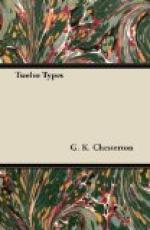may be inaccurate, Jack may not have climbed up so
tall a beanstalk, or killed so tall a giant; but it
is not such things that make a story false; it is
a far different class of things that makes every modern
book of history as false as the father of lies; ingenuity,
self-consciousness, hypocritical impartiality.
It appears to us that of all the fairy-tales none
contains so vital a moral truth as the old story,
existing in many forms, of Beauty and the Beast.
There is written, with all the authority of a human
scripture, the eternal and essential truth that until
we love a thing in all its ugliness we cannot make
it beautiful. This was the weak point in William
Morris as a reformer: that he sought to reform
modern life, and that he hated modern life instead
of loving it. Modern London is indeed a beast,
big enough and black enough to be the beast in Apocalypse,
blazing with a million eyes, and roaring with a million
voices. But unless the poet can love this fabulous
monster as he is, can feel with some generous excitement
his massive and mysterious ‘joie-de-vivre,’
the vast scale of his iron anatomy and the beating
of his thunderous heart, he cannot and will not change
the beast into the fairy prince. Morris’s
disadvantage was that he was not honestly a child
of the nineteenth century: he could not understand
its fascination, and consequently he could not really
develop it. An abiding testimony to his tremendous
personal influence in the aesthetic world is the vitality
and recurrence of the Arts and Crafts Exhibitions,
which are steeped in his personality like a chapel
in that of a saint. If we look round at the exhibits
in one of these aesthetic shows, we shall be struck
by the large mass of modern objects that the decorative
school leaves untouched. There is a noble instinct
for giving the right touch of beauty to common and
necessary things, but the things that are so touched
are the ancient things, the things that always to
some extent commended themselves to the lover of beauty.
There are beautiful gates, beautiful fountains, beautiful
cups, beautiful chairs, beautiful reading-desks.
But there are no modern things made beautiful.
There are no beautiful lamp-posts, beautiful letter-boxes,
beautiful engines, beautiful bicycles. The spirit
of William Morris has not seized hold of the century
and made its humblest necessities beautiful. And
this was because, with all his healthiness and energy,
he had not the supreme courage to face the ugliness
of things; Beauty shrank from the Beast and the fairy-tale
had a different ending.
But herein, indeed, lay Morris’s deepest claim to the name of a great reformer: that he left his work incomplete. There is, perhaps, no better proof that a man is a mere meteor, merely barren and brilliant, than that his work is done perfectly. A man like Morris draws attention to needs he cannot supply. In after-years we may have perhaps a newer and more daring Arts and Crafts Exhibition. In




